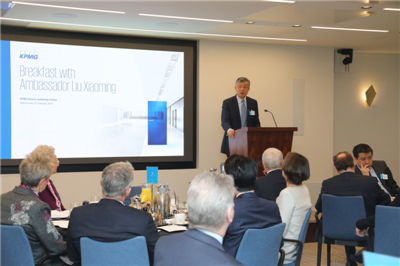Keynote Speech by H.E. Ambassador Liu Xiaoming at the KPMG Breakfast Meeting: The Chinese Economy: What has changed and what has not?
Embassy of the PRC in the UK | Updated: 2019-02-21 19:29

Third, the intensity and measures of reform have changed, but China’s determination to stay open has not.
China is deepening the supply-side structural reform and taking vigorous efforts to tap the potential of domestic consumption. In this process,
·We will put in place carefully measured macro regulation and control, and rely on market rules and rule of law.
·We will focus on invigorating micro-entities by giving enterprises and entrepreneurs the initiative. This will be achieved by giving them positive incentives and encouraging market competition.
·We will work on better circulation in our national economy, build a unified and open modern market system with orderly competition, and improve financial services. Through these efforts, we will enable a virtuous cycle between domestic market and producers, between economic growth and employment expansion, and between the financial sector and the real economy.
Amidst all these efforts, China is committed to the basic national policy of opening up. We have adopted a number of measures to increase market access and promote investment liberalisation and facilitation.
In 2018, China successfully hosted the first International Import Expo, and brought down average tariff from 9.8% to 7.5%.
According to World Bank report Doing Business 2019, China ranks the 46th out of 190 economies in the ease of doing business, moving up by 32 places than the previous year. The following figures show how this was achieved.
·Despite a steep 19% drop in global FDI, foreign investment flowing into China totaled $135 billion, increasing by 3%.
·Newly-set-up foreign businesses in China topped 60,000, increasing by 69.8%.
·Of all these, British investment in China soared by 150.1%.
With its concrete actions, China has demonstrated to the world its determination to support trade liberalisation and open its market.
Fourth, China’s role in the global governance has changed, but its resolve to share benefits with the world has not.
China cannot achieve development in isolation from the world, and the world needs China in realising global prosperity.
In recent years, China has played an active role in global governance. At the G20 summit, APEC Economic Leaders’ meeting and BRICS summit, China has stood up against protectionism and unilateralism, upheld the rule-based multilateral free trade system firmly, and proposed China’s plans and solutions. These have been important in making sure that multilateral dialogues focus on inclusive development and win-win cooperation.
China has also taken concrete actions in this respect.
China has been the largest contributor to world economic growth for many years in a row. In 2018, China accounted for nearly 30% of world economic growth. With huge consumer potential and investment opportunities, China has also created a large amount of jobs for the world.
Take the Belt and Road Initiative for example. BRI has become a public good for the whole world by allowing all participating parties to benefit from China’s development. By the end of 2018, China had invested $28.9 billion in countries along the BRI routes, paid $2 billion in tax to host countries and created 244,000 jobs for the local communities.
Looking ahead, I am confident that the Chinese economy, as the most important growth engine in the world, will maintain robust development and play an indispensable role in global economic growth.
Ladies and Gentlemen,
Dear Friends:
This year marks the 65th anniversary of the establishment of China-UK diplomatic relationship at the level of chargé d’affaires. Over the past 65 years, China and the UK have achieved fruitful results in our cooperation across the board, thanks to the concerted efforts of both sides. There have been numerous highlights in our economic, trade, investment and financial cooperation.
However, as we all know, China-UK relations encountered some setbacks last year. In order to cherish the hard-won momentum in the relations and keep to the direction of the “Golden Era”, both China and the UK should resist interruptions and bring the bilateral relations back on track at an early date.
Under such circumstances, it is my sincere hope that the business community, including KPMG, will leverage its advantages and seize the enormous opportunities of cooperation with China. This will inject much needed positive energy into the “Golden Era” and produce more “golden fruits”. In my opinion, UK businesses could find opportunities in the following three aspects:
























